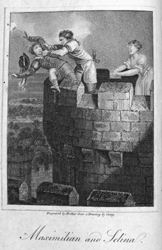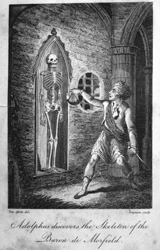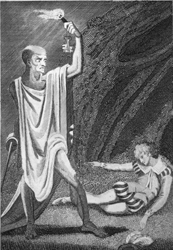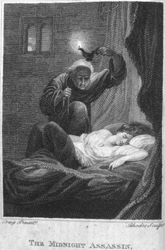
Zweihänder is basically what happens when someone's document of house rules for WFRP 2 gets so big that it turns into its own game. It addresses all the standard complaints that people have been making (and house-ruling) about WFRP since the 1980s, like 'why are some careers so much better than others?', 'how come a naked dwarf can ignore getting hit in the face with a battleaxe?', 'why does the game have all these stats that barely ever get used?', and the ever-popular 'why do I miss so fucking much in combat'?
In Zweihänder, every career offers the same number of skill and stat increases. The number of ability scores has been condensed down to seven. Numbers are higher across the board, making PCs more likely to succeed at whatever they're currently attempting. The combat and damage system has been rewritten: WFRP's system of wound points and critical hits has been replaced with a series of damage thresholds that forces players to roll on ever-more severe injury tables depending on how much damage they've taken, while combat now involves each character receiving three 'action points' per round, which they can choose to use to move, attack, perform special manoeuvres, and so on. Every monster comes with a sheaf of special rules, D&D 4 style, to make sure that fights will play out differently depending on the specific combatants involved. It all looks like a lot of work to me, but I'm very lazy about these things, and tend to lose patience with combat systems more complex than 'roll WS or under on 1d100 to stab the goblin in the face'. The same 'rules for everything' approach can be seen in the game's rules for social interactions, chases, wilderness travel, and just about everything else. A game that actually used all these rules would be far too heavy for my tastes, but I suspect that most groups will just mix and match, just like in every other RPG.
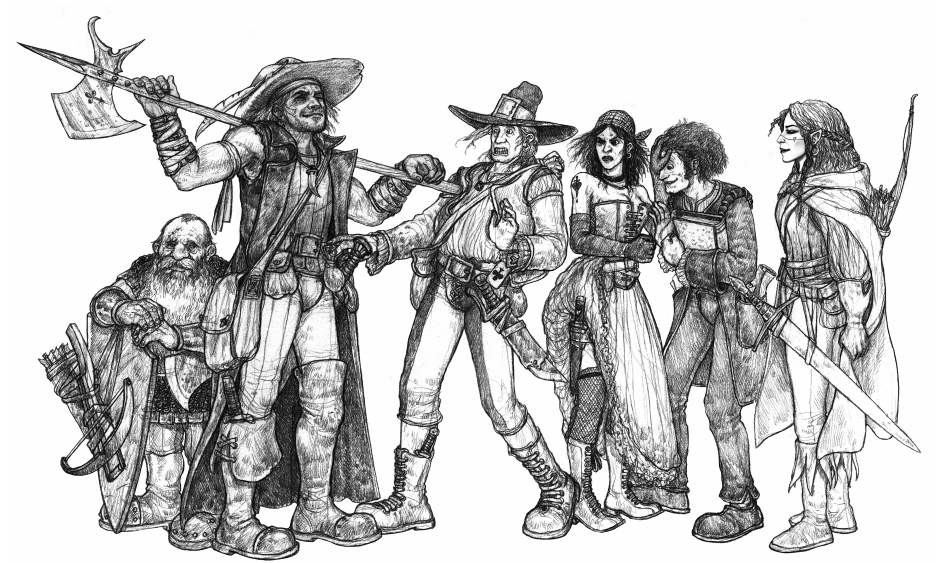
All of these are the kind of WFRP house rules that I can imagine a group making in the late 1980s, probably shortly after being exposed to GURPS, and represent a continuation of the changes that WFRP 2 made to WFRP 1. However, Zweihänder also includes some more 'modern' elements of game design. The four most important of these are Peril, Corruption, Fortune, and Professional Traits.
Peril is the way that the game tracks stress, fatigue, and all those other negative effects that fall short of actual injury. As you gain more Peril, your skills become less effective; if the Peril just keeps coming, then eventually you reach the point where you're so wrecked that you automatically fail at everything you attempt. I like the idea of this: I've written before about how I wish D&D had better ways of modelling the impact of hunger, exhaustion, cold, fear, and all the other cumulative stresses of the adventuring life, and I like the elegance of rolling them all together into a single mechanic that can cover everything from choking a guy out to someone being so terrified that they become totally non-functional, rather than trying to model them all separately.
What I'm less convinced by is the specific effects of Peril, namely disabling your skill ranks and pushing everyone steadily towards the level of untrained amateurs. If anything, I'd expect the reverse: the guy who's performed a task a thousand times before is precisely the one who's going to be able to perform it under crisis conditions, because even if his mind is currently blank with panic his hands are still going to remember what to do, whereas the half-trained amateur who relies on conscious knowledge rather than muscle memory might manage just fine under normal conditions, but is likely to be useless under pressure. It'd be easy to flip this, though, so that skill ranks were the last thing rather than the first thing to go as the Peril piles on.
Corruption seems to have grown out of WFRP's insanity point system. Anything likely to cause trauma - suffering serious injuries, witnessing horrible events, channeling weird magic, collapsing under a huge mass of Peril, etc - inflicts Corruption points. Using drugs and alcohol to temporarily blunt the effects of injuries, Peril, madness, or diseases also inflicts Corruption, as your short-term remedies exert a long-term toll on your mind and body: a brilliant bit of game design that I wish I'd thought of myself. At the end of every session you roll 1d10 and compare it to your Corruption score: equal or less means you gain 1 'chaos rank', higher means you gain one 'order rank'. (If you gained more than 10 in a single session, you get one chaos rank automatically for each ten points and then roll again against whatever's left.) Ten chaos ranks earns you a disorder. Ten order ranks earns you a fate point.
Where it gets weird is that Corruption also serves as the game's morality system. Corruption points are given out for evil actions, meaning that a PC who keeps being bad will go crazy just as fast as one who keeps getting traumatised, and a PC who does both will go mad twice as fast as either. This really does strike me as an attempt to make the same mechanic do two not-very-compatible things at once: and if I were using the system I'd be very tempted to decouple Corruption from fate points, and to reserve it for actions and experiences that caused mental strain, regardless of their moral status.

Fortune points are just reroll tokens. You can use them whenever you want, but then you have to hand them to the GM to use against you whenever they want. I'm really not sure about this: when I GM, it's very important to me that I try to run the world impartially. I think you'd need a very clear 'gentleman's agreement' between players and GM about whether the GM's tokens were to be used to make the game more interesting or more deadly, as otherwise I can imagine a lot of bad feeling being generated the first time the GM uses a bunch of fortune tokens to turn a trivial injury into a mortal wound.
Professional Traits are unique abilities that each career - sorry, 'profession' - grants to its members. Each profession grants exactly one special ability, and everyone who joins that profession gets it: so all Footpads can sneak attack, all Ratcatchers can speak to rats (yes, really), and so on. Some of these are really, really specific: Investigators, for example, get an ability called 'True Detective' that allows you to have visions, granting you extra clues 'when Intoxicated or under the effects of Deliriants', i.e. you are Rust Cohle. (Hope you didn't want to play any other sort of investigator instead!) I understand the desire to give the professions a bit more mechanical differentiation, but these traits strike me as needlessly narrow, and I probably wouldn't use them myself. I'm quite happy for each profession to just serve as a bundle of skill and stat increases.
Zweihänder's attitude towards its setting is a bit perplexing. It presents itself as a setting-agnostic toolkit suitable for use in any kind of low fantasy early modern setting, including seventeenth-century Earth, but its gods, monsters, and magic system have all been straightforwardly borrowed from WFRP. They're all here: orcs, skaven, Sigmar, Ulric, daemonettes, fimir, zoats, dragon ogres, slann, bog octopi, chaos dwarves, the chaos gods, the winds of magic... the entire Warhammer bestiary and cosmology, just with changed names and slightly modified descriptions. (Even mostly-forgotten oddities like WFRP's gnomes make the cut - as a PC race, no less!) Some of the changes are quite inventive, like the idea that goblins started out as chaos-tainted human children, but mostly they just look as though they've been subjected to tokenistic rewrites for copyright purposes. The bestiary gets most interesting when it goes furthest off-script: I liked its various giant intelligent animals, and I loved the idea of an order of jackal-headed vampire knights who use their long, forked tongues to drink the blood of their enemies. The vast majority of it, however, consists of straightforward Warhammer expies, clearly intended to allow published WFRP adventures to be run using Zweihänder with a minimum of fuss.
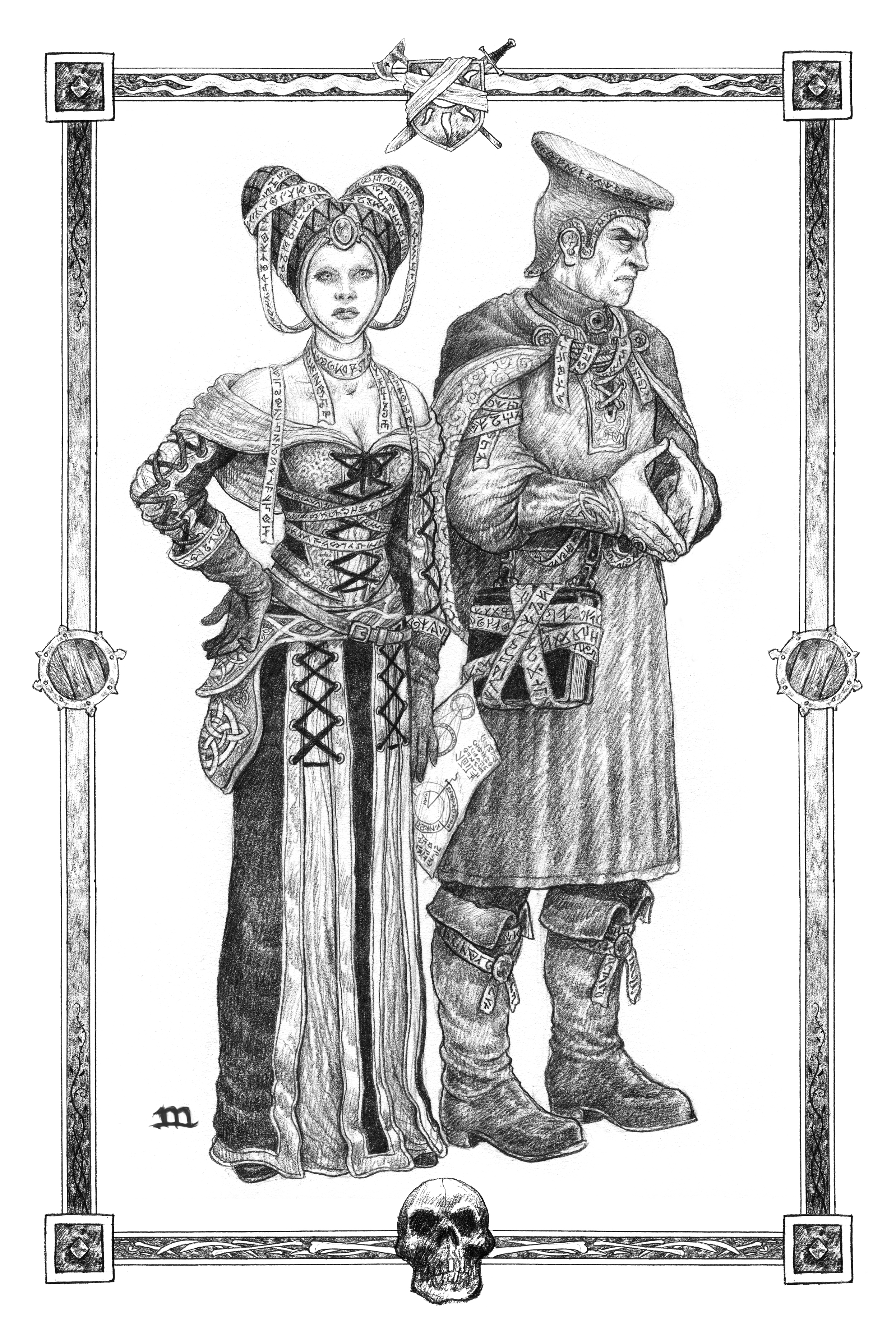
The Zweihänder core rulebook also includes an adventure, called 'A Bitter Harvest', which is essentially a rather grim historical adventure in flimsy fantasy drag. (The author even notes that it was inspired by an incident from the Baltic Crusades.) The PCs find themselves stuck in a village as raiders approach: the same raiders who attacked the village years before, abducting all the women and children who were hiding in a cave nearby, and carrying them off as slaves. But all is not as it seems: the leading men of the village actually sold the location of the cave to the raiders in exchange for being left alone, and one of the captured women - who was enslaved by the raider's leader, but has since come to effectively control the warband - now leads the raiders back towards the village in search of revenge on the men who sold them out. The roads have been cut, so the PCs need to find some way of resolving the situation, probably by uncovering the village's true past and leveraging what they've learned in order to buy it some kind of future.
This is a good adventure, filled with a rich tangle of interpersonal relationships, and the moment when the PCs discover what the 'heroes' of the previous battle actually did in order to get rid of the raiders should come as a genuine shock. The parts leading up to the siege are very linear, but the way in which the PCs resolve the main situation is left completely open, accommodating everything from the PCs assassinating the woman leading the raiders to them joining her in her search for revenge. (How often do you see that in published adventures?) That said, I had two issues with it. The first is that this is heavy stuff, much heavier than the standard-issue cultist-whacking that makes up most WFRP adventures. Not all groups are going to be comfortable unravelling a community's history of trauma and sexual violence, especially when there's no cathartic moment where you stab the bad people and make all the problems go away. The second is that, as I've indicated, this is barely a fantasy scenario at all. Supposedly the raiders are orcs (although they don't really act like it), and supposedly the woman has established control over them by dosing their food with alchemical potions, but this is little more than fancy dress, largely irrelevant to the real story. If your group plays fantasy RPGs for stories of magic and monsters, rather than sad stories of human weakness, then this might not quite fit the bill.
Overall, while I quite liked Zweihänder, I felt that it was aiming at a terribly small target market: people who had enough issues with WFRP that they weren't happy to just carry on playing WFRP 2, but who still liked it enough that they weren't prepared to abandon it for Shadow of the Demon Lord or D&D 5 or OSR D&D instead. That seems an awfully specific demographic of players... but, then again, Zweihänder is now an 'adamantium bestseller' on DrivethruRPG, so maybe there are a lot more of them than I thought. If you like the core ideas behind WFRP but want a more balanced career system and more options in combat, then give it a look. But main takeaways from it was that any WFRP-style system would probably benefit from some kind of 'peril track' to record just how tired, hungry, cold, sick, scared, and miserable everyone currently is, and that the world needs more jackal-headed vampire knights with serpentine tongues.

